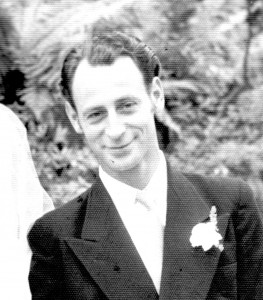FORCED LABOUR (WWII)
During WWII, about 500,000 Dutch people were made to do forced labour (Arbeitseinsatz) in Germany (and 30,000 died during this forced labour). Thirty percent of the white-collar workers and laborers in the entire German economy at this time were foreigners who had been brought into the country mostly by force. Conditions were very tough, and “an unknown number returned with permanent physical and psychological scars.”
The following descendants of Jean Isedore Allis & Antje Klaasen were made to do forced labour in Germany during WWII:
Descended from Jan Theodor Allis (1803):
Brothers Gerben de Jong (1917) and Willem de Jong (1918) – sons of Gerben de Jong & Gerardina Stok (and great-great grandsons of Jan Theodor Allis 1803).
Descended from Andre Louis Allis (1814):
Jan Fedde Allis (1898) – son of Andre Louis Allis & Johanna van Gorcom (and great-grandson of Andre Louis Allis 1814).
Jan Fedde Allis (1923).
Brothers Theodorus Allis (1925) and Johannes Albertus Allis (1923), and their cousin Johannes Jacobus Allis (1927) [great-great grandsons of Andre Louis Allis 1814].
Andre Louis Allis (1918).
Brothers Theodorus Allis (1925) and Johannes Albertus Allis (1923):
Jan and Theo, and one of their cousins (possibly “Johannes Jacobus Allis” b 1927) were sent to Germany during WWII to do forced labour. Fortunately, they were able to work together at the same factory (an armament factory located between Heidelberg and the river Neckar). The factory was owned by Smith/Schmidt and Schaute. The owner was Jewish, and was no longer there (he had either been sent to a concentration camp or gone into hiding).
sent to Germany during WWII to do forced labour. Fortunately, they were able to work together at the same factory (an armament factory located between Heidelberg and the river Neckar). The factory was owned by Smith/Schmidt and Schaute. The owner was Jewish, and was no longer there (he had either been sent to a concentration camp or gone into hiding).
Theo’s job was to put out any fire-bombs dropped by planes onto roofs. He worked 12 hours on, 12 hours off, day and night, 7 days a week with one day off. They were always hungry. They sometimes traded their meat tokens for bread with mothers and families (because bread was more filling than meat, and there was more of it).
Jan, the cousin, and a friend, successfully escaped the factory and made their way safely back to the Netherlands (Jan then joined the Dutch Underground). Theo tried to escape a few weeks later, too, however unfortunately he was caught and sent to a prison camp. He spent the rest of the war in prison camps in Germany. Conditions were very tough in the prison camps. The prisoners were always very hungry, and they would take turns excusing themselves to the toilet so that they could scavenge for food in the rubbish bins. If any attempted to escape they would have been shot immediately. Theo was freed from the prison camps after the war ended in 1945 (he was then conscripted, and spent five years in the Dutch Army in Indonesia before immigrating to New Zealand).
After the war, German companies that had used forced labour during the war paid compensation to their forced labourers. The company that Theo, Jan & their cousin had worked for, however, had shut down and couldn’t pay them any compensation.
